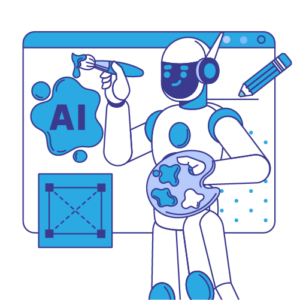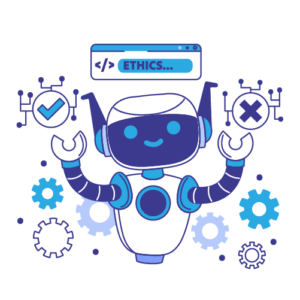Introduction
The rapid advancement of artificial intelligence (AI) has revolutionized numerous industries, offering unprecedented opportunities for innovation and efficiency. However, with these advancements come significant concerns about data privacy. As AI systems become more integrated into our daily lives, the need to balance innovation with robust security measures becomes crucial. This blog post explores the intersection of AI and data privacy, highlighting the challenges, implications, and strategies to ensure that innovation does not come at the cost of personal security.
The Rise Of AI: Opportunities And Challenges

AI technologies, including machine learning, natural language processing, and computer vision, have transformed how businesses operate. They offer solutions that can analyze vast amounts of data, predict trends, and automate complex tasks. For instance, AI-driven systems can enhance customer experiences through personalized recommendations, streamline supply chains, and even assist in medical diagnostics.
However, these capabilities require access to large datasets, often containing sensitive personal information. The collection, storage, and analysis of such data raise significant privacy concerns. Misuse of data, whether through breaches, unauthorized access, or unethical practices, can lead to severe consequences for individuals and organizations alike.
AI’s ability to process and analyze large datasets allows for innovative applications across various sectors. In healthcare, AI algorithms can analyze patient data to identify patterns and predict disease outbreaks. In finance, AI can detect fraudulent transactions and automate customer service. In marketing, AI-driven personalization enhances customer engagement by tailoring content to individual preferences. While these applications demonstrate the potential of AI, they also highlight the necessity for stringent data privacy measures.
Understanding Data Privacy In The AI Era
Data privacy refers to the right of individuals to control how their personal information is collected, used, and shared. In the context of AI, this concept extends to ensuring that AI systems handle data ethically and securely. The challenges of maintaining data privacy in AI include:
1. Volume and Variety of Data: AI systems require vast amounts of diverse data to function effectively. This data often includes personally identifiable information (PII), which, if mishandled, can lead to privacy violations.
2. Data Sharing and Third-Party Access: AI development often involves multiple stakeholders, including third-party vendors and partners. Ensuring that all parties adhere to strict data privacy standards is challenging.
3. Algorithmic Transparency: AI algorithms can be complex and opaque, making it difficult to understand how decisions are made. This lack of transparency can hinder efforts to ensure that AI systems are not misusing data.
The concept of data privacy in AI also encompasses the ethical considerations of how data is collected and used. For example, when AI systems collect data from social media platforms, there is a risk of violating users’ privacy expectations. Additionally, the use of facial recognition technology raises concerns about surveillance and the potential for misuse by authoritarian regimes. These ethical challenges necessitate a comprehensive approach to data privacy that goes beyond technical solutions.
Regulatory Landscape: Navigating Data Privacy Laws

Governments and regulatory bodies worldwide are increasingly recognizing the importance of data privacy in the age of AI. Various laws and regulations have been enacted to protect individuals’ data rights. Some of the most notable include:
1. General Data Protection Regulation (GDPR): Implemented in the European Union, GDPR sets strict guidelines for data collection, processing, and storage. It grants individuals significant control over their data and imposes hefty fines for non-compliance.
2. California Consumer Privacy Act (CCPA): Similar to GDPR, CCPA provides California residents with rights over their personal data, including the right to know what data is collected and the ability to request its deletion.
3. Personal Data Protection Bill (PDPB): India’s proposed PDPB aims to regulate the processing of personal data and ensure individuals’ privacy rights.
Compliance with these regulations requires businesses to implement robust data privacy measures and continually adapt to evolving legal standards. For instance, GDPR mandates that organizations obtain explicit consent from individuals before collecting their data. It also requires businesses to provide clear information about how data will be used and to allow individuals to request the deletion of their data. These requirements necessitate significant changes to data handling practices and the implementation of new technologies to ensure compliance.
Balancing Innovation And Security: Best Practices
To achieve a balance between AI innovation and data privacy, organizations must adopt comprehensive strategies that prioritize security without stifling technological progress. Here are some best practices:
1. Data Minimization: Collect only the data necessary for AI applications and ensure it is anonymized wherever possible. Reducing the amount of PII handled by AI systems can significantly mitigate privacy risks. For example, instead of collecting full addresses, businesses might only need zip codes to achieve their AI objectives.
2. Implement Strong Data Governance: Establish clear policies and procedures for data handling, including access controls, data encryption, and regular audits. A robust data governance framework ensures that data privacy is maintained throughout the data lifecycle. Organizations should also consider appointing a Data Protection Officer (DPO) to oversee compliance with data privacy regulations and to act as a liaison with regulatory bodies.
3. Enhance Algorithmic Transparency: Develop AI systems with transparency in mind. This includes creating explainable AI models that provide insights into how decisions are made, which helps build trust and ensures accountability. Tools such as Local Interpretable Model-agnostic Explanations (LIME) and SHapley Additive exPlanations (SHAP) can be used to interpret complex AI models and explain their decisions to users.
4. Foster a Privacy-First Culture: Promote a culture of privacy within the organization by training employees on data privacy principles and the importance of ethical AI use. Encourage a mindset where privacy is considered at every stage of AI development. Regular training sessions and workshops can help employees stay informed about the latest privacy regulations and best practices.
5. Collaborate with Regulators: Engage with regulatory bodies to stay informed about evolving data privacy laws and ensure compliance. Proactive collaboration can also help shape future regulations that balance innovation and security. Organizations should participate in industry forums and working groups to stay updated on regulatory developments and to contribute to the development of best practices.
6. Leverage Privacy-Enhancing Technologies: Utilize technologies such as differential privacy, federated learning, and homomorphic encryption to enhance data privacy. These technologies allow AI systems to learn from data without compromising individual privacy. For example, differential privacy techniques add noise to data, making it difficult to identify individual records while still allowing for useful analysis.
Case Studies: Successful Integration Of AI And Data Privacy

Several organizations have successfully integrated AI while maintaining robust data privacy measures. For example:
1. Apple’s Differential Privacy: Apple uses differential privacy techniques to collect data from users’ devices without compromising individual privacy. This approach allows Apple to improve its services while ensuring that personal data remains confidential. By adding random noise to data, Apple can analyze user behavior without revealing individual users’ information.
2. Google’s Federated Learning: Google has implemented federated learning, a technique that enables AI models to be trained across multiple devices without sharing raw data. This ensures that sensitive information stays on users’ devices, enhancing privacy. Federated learning allows AI models to improve by learning from decentralized data sources while keeping the data itself local.
The Future Of AI And Data Privacy
As AI continues to evolve, the importance of data privacy will only grow. Future developments in AI must consider privacy as a fundamental component. This includes designing AI systems that are inherently privacy-preserving and developing new technologies that enhance privacy without hindering innovation.
Researchers and policymakers must work together to create a framework that supports both technological advancement and data protection. This collaboration will be crucial in building AI systems that are not only powerful but also trustworthy and secure.
The integration of AI and data privacy will likely involve the development of new ethical guidelines and industry standards. Organizations will need to adopt a proactive approach to privacy, continuously monitoring and adapting their practices to address emerging risks. Additionally, public awareness and education about data privacy will be essential in building trust and ensuring that individuals understand their rights and how their data is being used.
Conclusion
Balancing AI innovation with data privacy is a complex but essential endeavor. As AI technologies become more pervasive, organizations must prioritize data privacy to build trust and protect individuals’ rights. By adopting best practices, complying with regulations, and leveraging privacy-enhancing technologies, businesses can harness the power of AI while safeguarding personal data. The future of AI depends on our ability to innovate responsibly, ensuring that security and privacy are never compromised.
Final Thought
At H&L Consulting, we specialize in providing innovative AI solutions while prioritizing data privacy and security. Our team of experts ensures that your business can leverage the power of AI without compromising on privacy. Contact us today to learn how we can help you navigate the complexities of AI and data privacy.
If you are looking for an experienced IT provider, H&L Consulting is the best option. With years of experience, we specialize in mobile app development, web app development, staff augmentation, and robot process automation.Our staff of over 30 highly qualified IT consultants and developers can handle projects of any scale. We are committed to supporting your goals after successfully delivering over 50 solutions to clients throughout the world. Contact us for a full discussion, knowing that H&L Consulting is prepared to fulfill all your IT demands with specialized, effective solutions.









